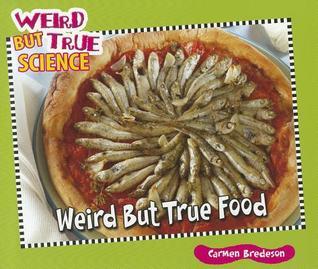nerd teacher [books] reviewed Weird but True Food by Carmen Bredeson
A Good Reminder of Eurocentrism in Kids Publishing
1 star
This book is terrible, and a good majority of it feels like we're just pointing at non-European cultures and going "Hahaha! This is weird!" I would not include this in a primary school class, and I would not give this to any young child that I know. I would only use it as an exploration in the problems of publishing, particularly in non-fiction literature that kids have been presented with.
First and foremost, there is one singular European culture that's pointed at, and it's because they include Swiss cheese (because bacteria are added to the milk, and the gas they expel creates the holes in the cheese). Two other foods which are made to seem incredibly foreign (by the use of images) but are also used in Europe include rose petals (not sure how those are weird) and seaweed in the form of 'carrageenan' (and could be found in ice …
This book is terrible, and a good majority of it feels like we're just pointing at non-European cultures and going "Hahaha! This is weird!" I would not include this in a primary school class, and I would not give this to any young child that I know. I would only use it as an exploration in the problems of publishing, particularly in non-fiction literature that kids have been presented with.
First and foremost, there is one singular European culture that's pointed at, and it's because they include Swiss cheese (because bacteria are added to the milk, and the gas they expel creates the holes in the cheese). Two other foods which are made to seem incredibly foreign (by the use of images) but are also used in Europe include rose petals (not sure how those are weird) and seaweed in the form of 'carrageenan' (and could be found in ice cream as a thickener).
The rest are either generically attributed to Native Americans (cactus? for all of them?) or Africans (blood? a lot of people, even in Europe, eat blood), attribute foods to specific countries, or have absolutely no mention of where they're from with imagery doing the implication for them.
On top of being poor representation of food (and also entirely out of date, though I keep finding it on recommended lists for children with limited reading skills), it's also just... bad? So even if the information wasn't purely a eurocentric view of food, it would also just be boring. No information about how things are used, how they're prepared, how they're eaten, etc. Just silly quips that effectively read: "People eat durian! It stinks! How weird!"
You'd be better off exploring a cookbook with a child rather than this garbage.

